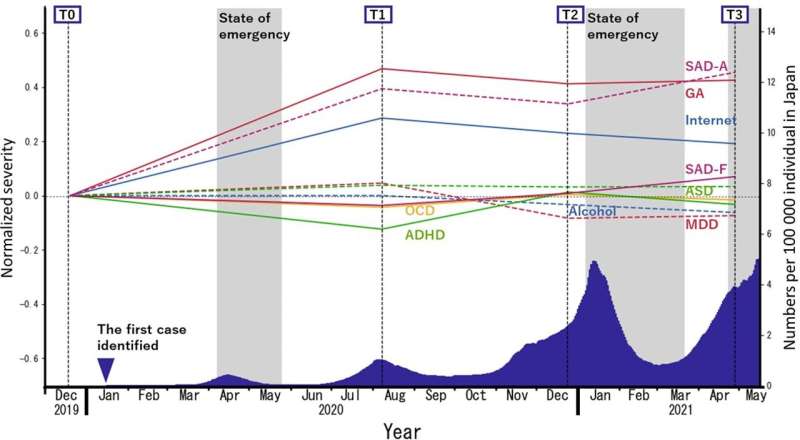How does the prolonged COVID-19 pandemic affect mental health?

Leading experts have cautioned that prolonged effects of the COVID-19 pandemic may cause serious mental health problems. To deal with these problems, this study tracked nine psychiatric symptoms in the general population. These were first collected just before the pandemic and were resampled for about a year and a half during it. By examining changes in multiple symptoms in terms of principal components, it became clear that there was a "general psychiatric burden" in addition to "depression/anxiety" that peaked in the early stages of the pandemic, but "social isolation" peaked a year later. Each of these components has different risk factors. By understanding these and by taking appropriate countermeasures, we may be able to mitigate psychological suffering caused by the COVID-19 pandemic.
Most of us probably family and friends who have become social recluses, or co-workers who feel depressed and are unable to come to work. The prolonged stress of the COVID-19 pandemic has had several effects on mental health because people are continuously being stressed by changes in their environments, such as restrictions on activities, school closures, and remote work, or no work. Some people have become depressed due to anxiety about infection and many have experienced exhaustion. Others are isolated from society and have gradually become dependent on the internet to relieve their loneliness. Worse yet, suicides in Japan have increased since before the pandemic, and this increase is related to mental health problems. Thus, the effect of the pandemic on mental health is a complex combination of problems that change over time. However, most research to date has focused on individual symptoms at single points in time, and there is no comprehensive understanding of the pandemic's impact on mental health. To develop such understanding, we conducted a series of surveys and examinations about various mental states.
The team examined the impact of the COVID-19 pandemic on psychiatric symptoms by using questionnaires that fortuitously were distributed over the internet in December 2019, just before the pandemic, and then again in August 2020, December 2020, and April 2021, during the pandemic. Using data-driven statistical methods, changes in psychiatric symptoms during the pandemic were categorized into the following four components: (1) general psychiatric burden, which is the interplay of all psychiatric symptoms; (2) social isolation, associated with internet dependence and social anxiety; (3) alcohol-related problems; and (4) depression/anxiety. General psychiatric burden, social isolation, and depression/anxiety worsened during the pandemic. But while general psychiatric burden'' and depression/anxiety peaked soon after the beginning of the pandemic, social isolation continued to worsen progressively through the pandemic.
Next, the team sought to identify factors that most aggravated the risks within each component. All components were more likely to worsen in women than in men. This highlights an urgent need to reduce the physical and mental burden that falls on women during the pandemic. The general psychiatric burden and depression/anxiety that peaked in the early stages of the pandemic, were greatly affected by the decrease in income during the pandemic. On the other hand, social isolation, which has continued to deteriorate gradually, was less likely to do so among those who changed the amount that they communicated with others and those who were self-employed. The importance of job type in social isolation suggests the influence of the work environment, human relations, types of work, and the ways that people connect with their colleagues.
How can society address these mental problems? Whereas economic policies were important in the early stage of the pandemic, policies, programs, and public education to maintain connections between people and throughout society may be more important from this point forward. It will certainly be necessary to continue to monitor the impact of the COVID-19 pandemic on public mental health.
"As the COVID-19 pandemic was prolonged, social anxiety and internet addiction issues emerged," notes Dr. Shuken Boku, a co-author on the paper and associate professor at Kumamoto University in Japan. "Social anxiety and internet addiction cause social isolation, and social isolation contributes to social anxiety and internet addiction. This vicious cycle needs to be addressed as soon as possible before the problem becomes more serious. It is important to maintain social connections by increasing opportunities to see each other and have face-to-face contact, even online. This is especially true for those who are isolated from the society during the COVID-19 pandemic."
More information: Taiki Oka et al, Multiple time measurements of multidimensional psychiatric states from immediately before the COVID-19 pandemic to one year later: a longitudinal online survey of the Japanese population, Translational Psychiatry (2021). DOI: 10.1038/s41398-021-01696-x





















